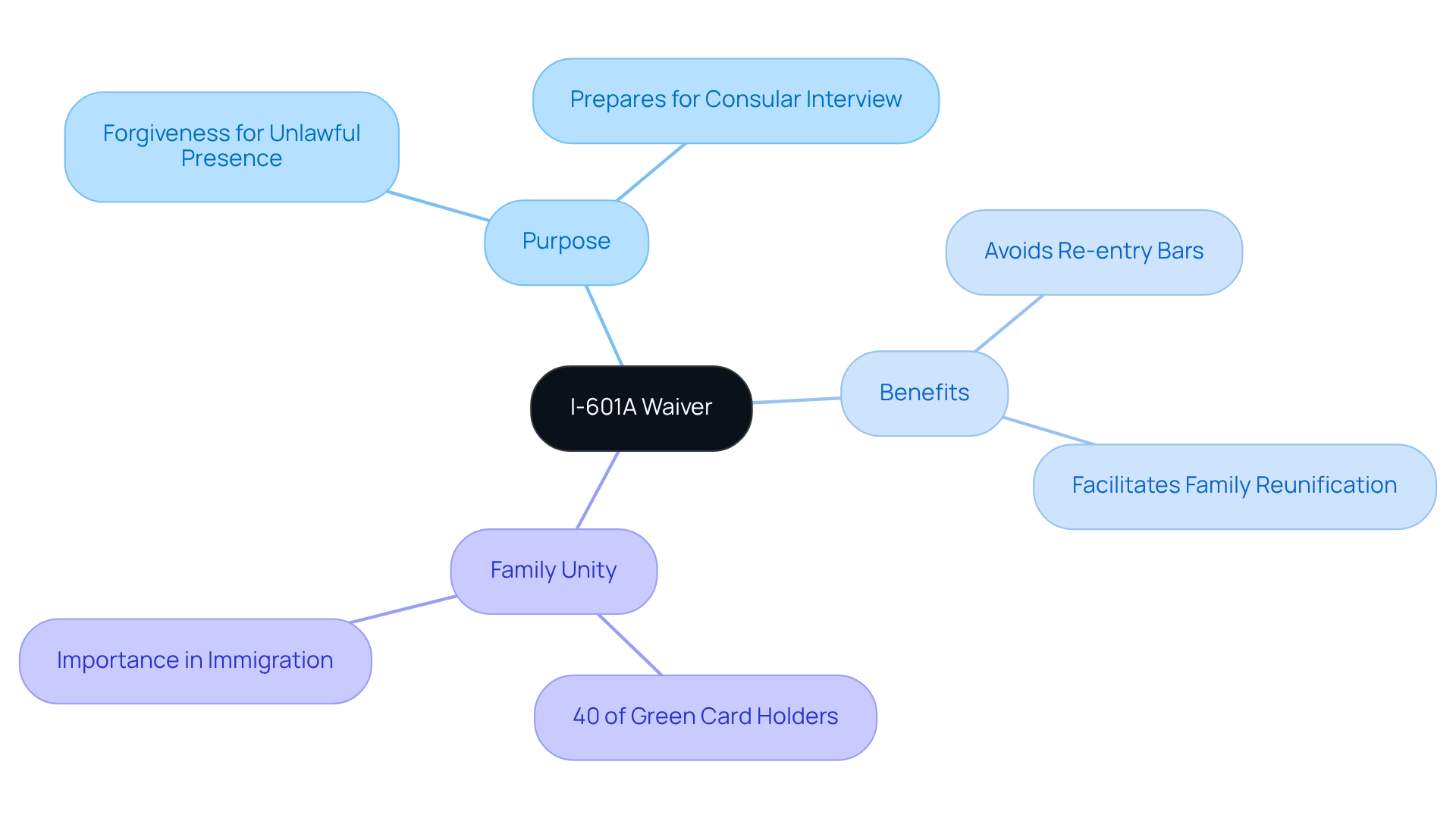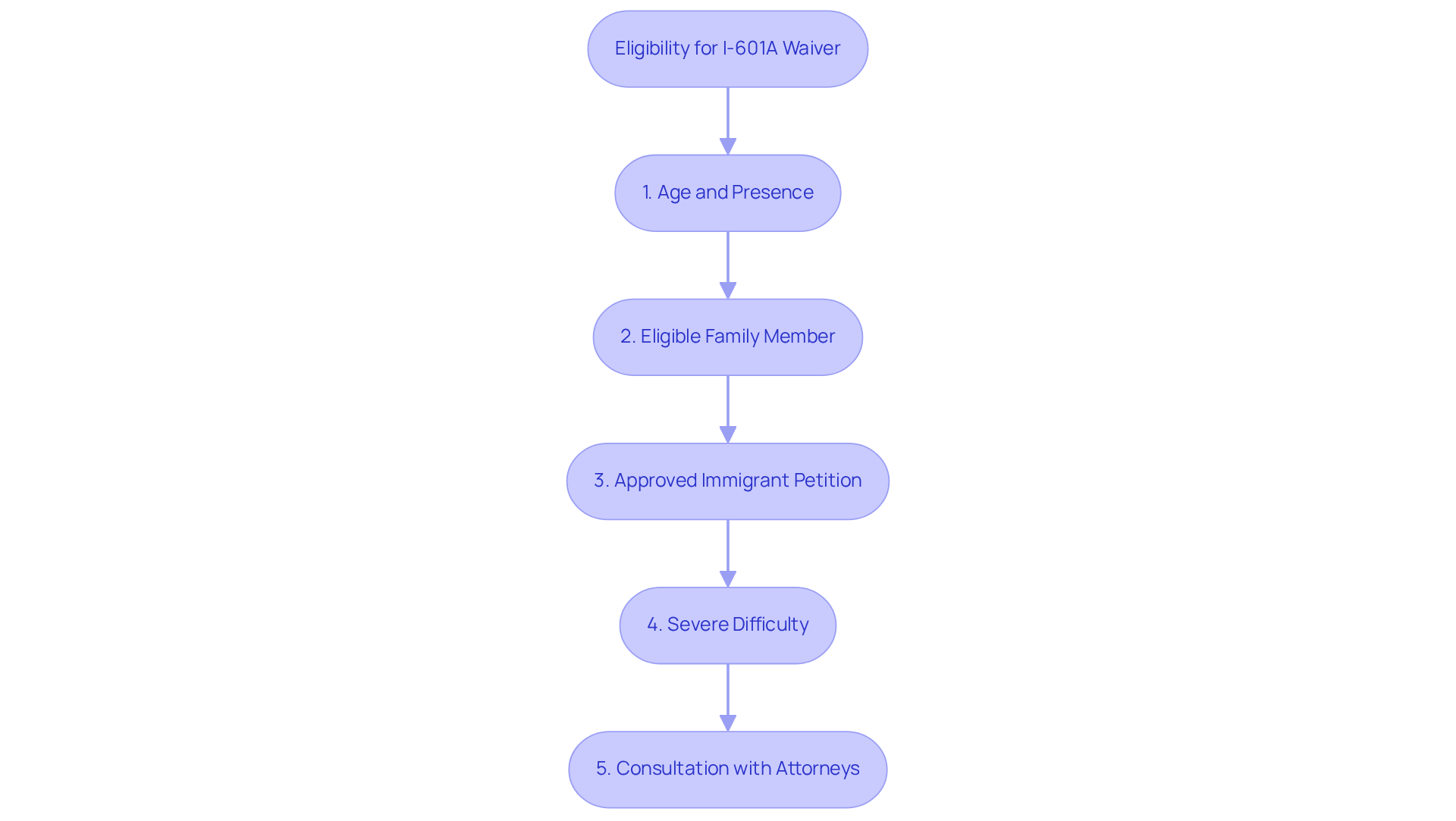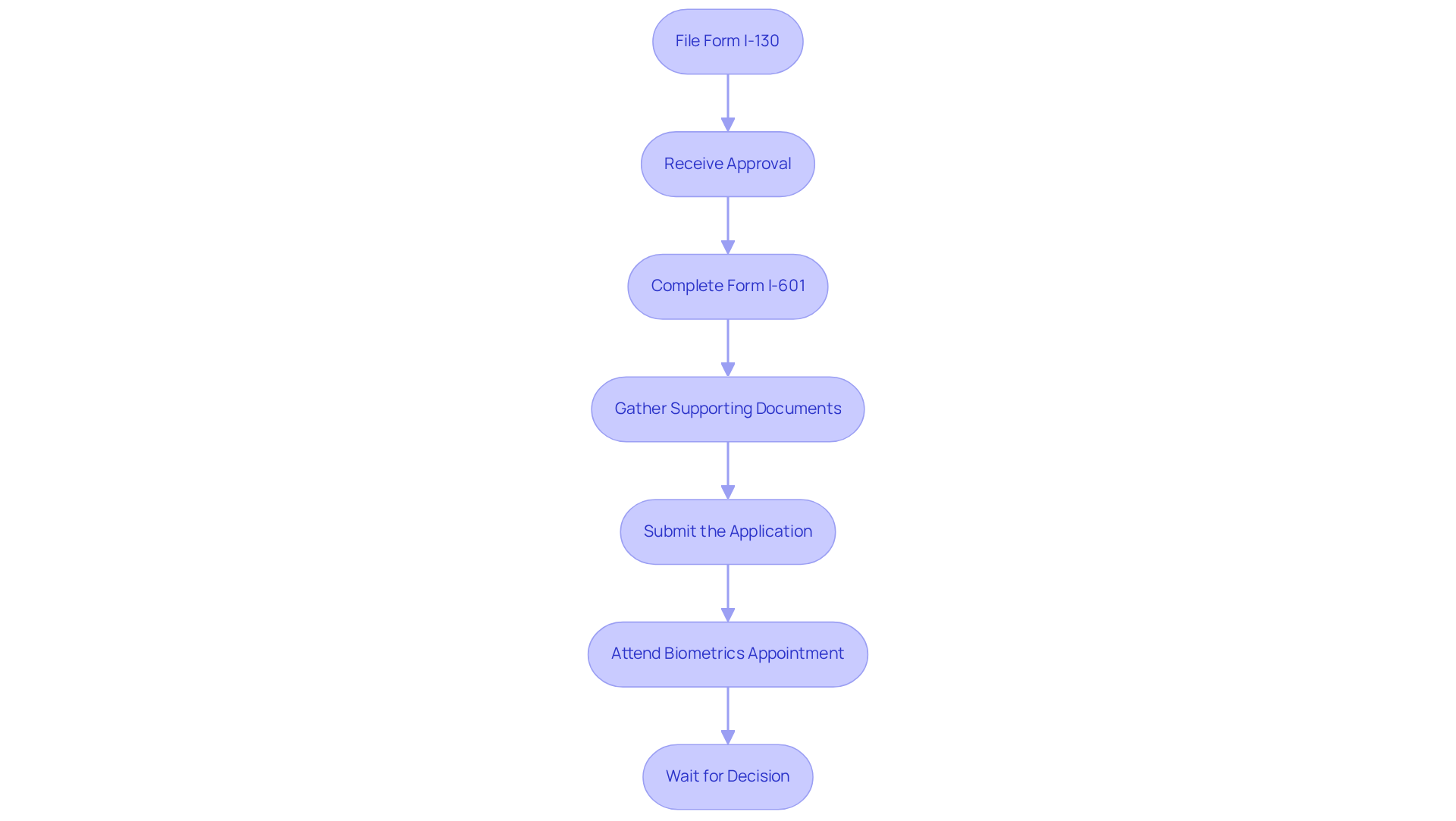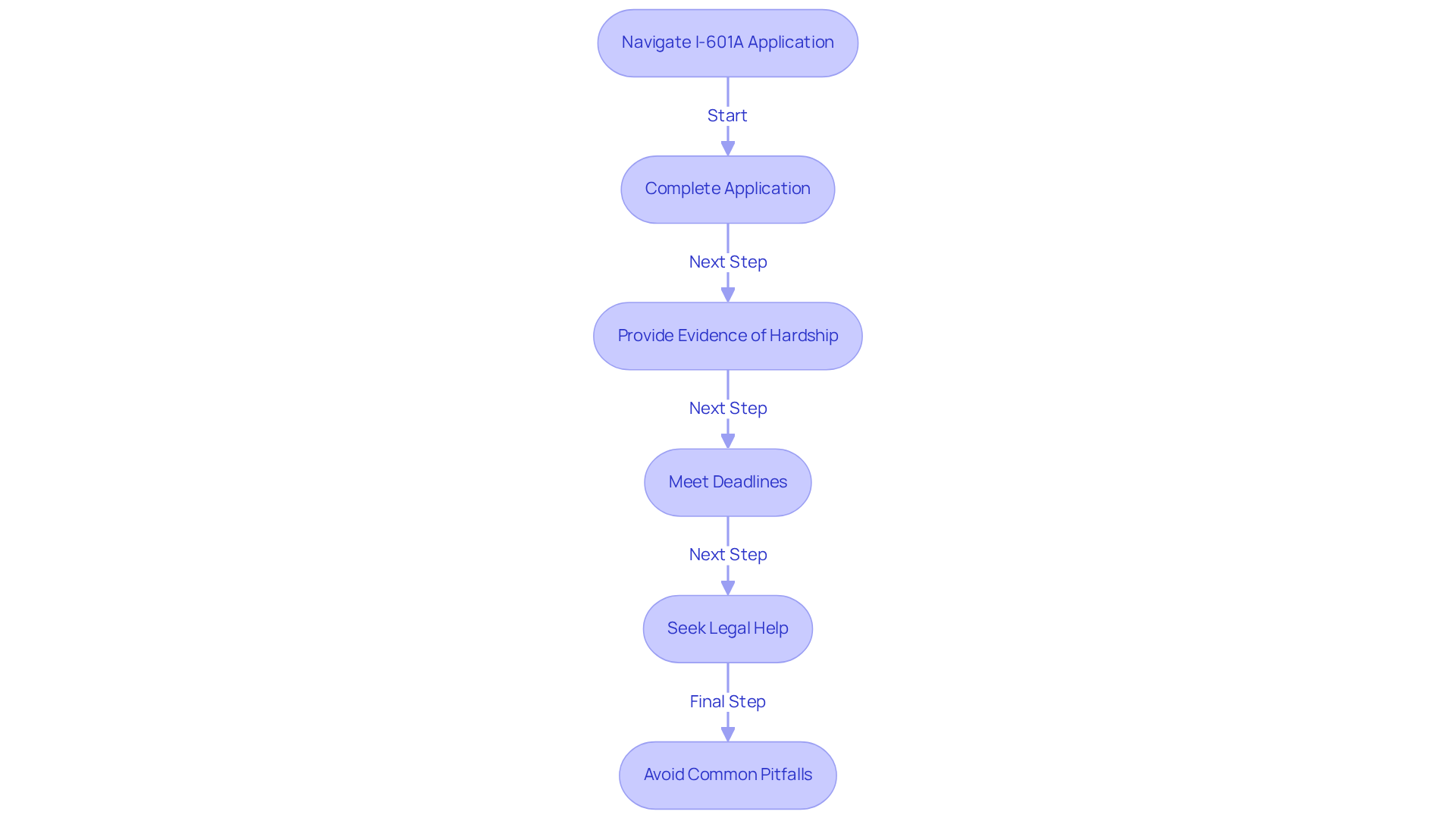Overview
This article serves as a comprehensive guide designed to empower immigrants in mastering the I-601A waiver application process. It begins by acknowledging the real struggles clients face when navigating confusing immigration processes. The purpose of the waiver is clearly outlined, along with eligibility criteria and a detailed step-by-step application process.
We emphasize the importance of avoiding common pitfalls and seeking legal assistance to enhance the chances of approval. Remember, you are not alone in this fight; we are here to guide you every step of the way.
Introduction
Navigating the complexities of U.S. immigration can be overwhelming, especially for those grappling with the challenges of unlawful presence. The I-601A Waiver serves as a vital tool for many immigrants, offering a pathway to forgiveness and family reunification. This allows individuals to address their immigration status while minimizing separation from loved ones. However, the process is riddled with potential pitfalls and stringent eligibility requirements.
How can applicants ensure they qualify and successfully navigate the application process to avoid common mistakes that could jeopardize their future?
We understand how overwhelming this feels. You’re not alone in this fight—we’ll guide you every step of the way.
Understand the I-601A Waiver: Purpose and Importance
The 601a exemption, officially known as the Application for Provisional Unlawful Presence Exemption, serves as a vital resource for immigrants unlawfully present in the United States who have U.S. citizen or lawful permanent resident relatives. This exemption under 601a allows qualified individuals to seek forgiveness for their unlawful presence before departing the U.S. for a consular interview. Its primary goal? To enhance family unity by reducing the time families are apart during the immigration process.
By securing this exemption under 601a, applicants can avoid the 3- or 10-year re-entry bars that typically affect those with a history of unlawful presence. Recent updates highlight the exemption's importance in fostering family unity, with family-based immigration accounting for about 40% of new green card holders each year. Understanding the purpose and is essential for navigating the complex immigration landscape effectively.

Determine Eligibility for the I-601A Waiver
To qualify for the I-601A waiver, applicants must meet several essential criteria:
- Age and Presence: Applicants must be at least 17 years old and physically present in the United States when submitting the request.
- Eligible Family Member: An eligible family member is required, which can include a U.S. citizen or lawful permanent resident spouse or parent. It’s important to note that children do not qualify as family members for this exemption, although their well-being can be considered in the hardship narrative.
- Approved Immigrant Petition: An approved immigrant visa petition (Form I-1601a0) is crucial for the applicant to proceed with the exemption request.
- Severe Difficulty: The applicant must convincingly demonstrate that their qualifying family member would face severe difficulty if the waiver is not granted.
Understanding these is vital for a successful application. Many applicants have navigated this process effectively by clearly articulating the potential hardships their U.S. citizen or lawful permanent resident relatives would endure. Recent data indicates that a significant number of applicants for this immigration program come from diverse backgrounds, emphasizing the ongoing need for lawful pathways to normalize immigration status.
As immigration attorneys often emphasize, the complexity of these requirements highlights the necessity of personalized legal support to improve the chances of approval. To take the first step, we encourage you to schedule your free consultation with Vasquez Law Firm. During this meeting, you will meet with our attorneys, discuss your case details, and receive tailored legal advice. Remember, each case is unique, and effectively presenting the circumstances surrounding extreme hardship can greatly influence the outcome.

Follow the Step-by-Step Application Process for the I-601A Waiver
Navigating the exemption application process can feel overwhelming, but we’re here to guide you every step of the way. Here’s a practical roadmap to help you through:
- File Form I-130: Start by having a qualifying relative submit Form I-130, Petition for Alien Relative, to USCIS.
- Receive Approval: It’s crucial to wait for the endorsement of the I-130 petition before moving forward with the waiver.
- Complete Form I-601: Fill out Form I-601 with care, ensuring all information is complete and correct.
- Gather Supporting Documents: Compile necessary documentation, including proof of the qualifying relationship and evidence showing extreme hardship to the qualifying relative.
- Submit the Application: Send the completed Form I-601A along with the required fee of $795 to the designated USCIS address.
- Attend Biometrics Appointment: If requested, don’t hesitate to attend a biometrics appointment to provide fingerprints and photographs.
- Wait for Decision: After submission, patiently await of your request and their decision.
Remember, incomplete submissions or missing documentation can lead to delays or denials, especially given the heightened scrutiny and Requests for Evidence (RFEs) issued by USCIS in 2025 for hardship claims. As of 2025, processing durations for specific immigration relief requests average between 12 to 20 months. It’s also important to note that applicants must be physically present in the U.S. to be eligible for the waiver. By carefully following these steps, you simplify your submission process and enhance your chances of approval. We’re in this fight with you, and your future matters to us.

Navigate Challenges and Avoid Pitfalls in the I-601A Application
Navigating the application process can be a significant challenge, especially for immigrant families striving for reunification. At Vasquez Law Firm, we deeply understand these hurdles. Our team of experienced attorneys, boasting over 100 years of combined experience, is dedicated to serving the Hispanic community. To boost your chances of success, it’s vital to steer clear of these common pitfalls:
- Incomplete Applications: Make sure every section of Form I-601A is fully completed. Missing information can cause unnecessary delays or outright denials, which can severely impact your case.
- Insufficient Evidence of Hardship: Providing compelling evidence is crucial. You must demonstrate the your qualifying relative would face if the waiver is not granted. This evidence may include medical records, financial statements, and personal affidavits that clearly articulate the impact of separation.
- Ignoring Deadlines: Stay vigilant about all deadlines related to your submission, including those for submitting supporting documents. Missing these deadlines can jeopardize your application and result in further complications. Remember, failing to meet deadlines can lead to significant delays or even rejection of your submission.
- Not Seeking Legal Help: Consulting with an experienced immigration attorney, like those at Vasquez Law Firm, can be invaluable. Our expertise, backed by a 97% success rate, helps identify potential issues in your submission before it’s sent, greatly reducing the risk of mistakes that could cause delays or rejections. As USCIS states, "Ignoring legal counsel can lead to mistakes in navigating immigration laws."
At Vasquez Law Firm, we provide free consultations and flexible payment options to ensure our services are accessible to hardworking families. By recognizing these challenges and actively addressing them, applicants can significantly improve their chances of a successful immigration application. Success stories abound where families have been reunited and dreams of living in the U.S. have been fulfilled through careful preparation and legal support. Remember, the stakes are high, and a meticulous approach can make all the difference in navigating the complexities of the 601a process.

Conclusion
The I-601A waiver stands as a vital lifeline for immigrants grappling with the complexities of unlawful presence in the U.S. It allows individuals to seek forgiveness before departing for consular interviews, significantly strengthening family unity and alleviating the emotional and logistical burdens of separation. Understanding its purpose and benefits is crucial for effectively navigating the immigration system and fostering hope for families striving for reunification.
In this article, we explored essential aspects of the I-601A waiver, including eligibility criteria, the step-by-step application process, and common pitfalls to avoid. Key highlights include:
- The necessity of demonstrating extreme hardship faced by qualifying relatives.
- The importance of submitting complete and accurate applications.
- The value of seeking legal assistance to improve approval chances.
Each of these elements is pivotal in ensuring a smoother journey through the immigration landscape.
Ultimately, the significance of the I-601A waiver cannot be overstated. It not only provides a pathway for individuals to regularize their status but also reinforces the fundamental value of family unity within the immigration framework. For those considering this route, taking proactive steps—such as consulting with experienced immigration attorneys and meticulously preparing applications—can lead to substantial differences. Embracing this opportunity can pave the way for successful outcomes and the realization of dreams for countless immigrant families. Remember, we’re here to fight for your family.
Frequently Asked Questions
What is the I-601A waiver?
The I-601A waiver, officially known as the Application for Provisional Unlawful Presence Exemption, is a resource for immigrants unlawfully present in the United States who have U.S. citizen or lawful permanent resident relatives.
What is the purpose of the I-601A waiver?
The primary purpose of the I-601A waiver is to allow qualified individuals to seek forgiveness for their unlawful presence before departing the U.S. for a consular interview, thereby enhancing family unity.
How does the I-601A waiver benefit applicants?
By securing the I-601A waiver, applicants can avoid the 3- or 10-year re-entry bars that typically apply to individuals with a history of unlawful presence.
Why is the I-601A waiver important for family unity?
The I-601A waiver is important for family unity as it reduces the time families are apart during the immigration process, which is crucial for those with family-based immigration connections.
What percentage of new green card holders are accounted for by family-based immigration?
Family-based immigration accounts for about 40% of new green card holders each year.
Why is it essential to understand the I-601A waiver?
Understanding the I-601A waiver is essential for effectively navigating the complex immigration landscape, particularly for those seeking to maintain family unity while addressing unlawful presence issues.




